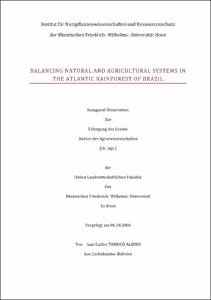Torrico Albino, Juan Carlos: Balancing Natural and Agricultural Systems in the Atlantic Rainforest of Brazil. - Bonn, 2006. - Dissertation, Rheinische Friedrich-Wilhelms-Universität Bonn.
Online-Ausgabe in bonndoc: https://nbn-resolving.org/urn:nbn:de:hbz:5N-09366
Online-Ausgabe in bonndoc: https://nbn-resolving.org/urn:nbn:de:hbz:5N-09366
@phdthesis{handle:20.500.11811/2395,
urn: https://nbn-resolving.org/urn:nbn:de:hbz:5N-09366,
author = {{Juan Carlos Torrico Albino}},
title = {Balancing Natural and Agricultural Systems in the Atlantic Rainforest of Brazil},
school = {Rheinische Friedrich-Wilhelms-Universität Bonn},
year = 2006,
note = {The aim of this work was to find ways of balancing natural and agricultural systems (AS) in the Atlantic rainforest of Brazil. Trade-offs and synergies were analyzed. Energy and emergy analysis, agro-biodiversity assessment, eco-volume were used as methodologies. Seven agricultural systems and 3 natural systems were studied.
Agro-climax was defined as the equilibrium point between the natural and agricultural systems. Biodiversity management and conservation activities were analyzed and the corresponding biodiversity indices calculated. Finally, the farmer perception of biodiversity was presented. Ecological and sylvopastoral systems contribute positively to the conservation of biodiversity, on the contrary, dominant cattle systems are the main cause for forest fragmentation, breaking the dynamics of animal and plant populations. The main primary agricultural production systems have low energy conversion ratio, and store only small quantities of energy (biomass) in the system. The ecological system has the most efficient use of energy, and saves great biomass quantity in the system. The cattle system presents the lowest values for all energy and biomass parameters causing largest environmental damage. All vegetable systems present positive economic indicators, the cattle only negative ones. The ecological system, presents highest sustainability in ecological terms.
The basin as a system contributes positively to the economy. It gives more emergy than that it takes from the economic system in form of materials and services. This fact represents also a loss of capital. The environmental impact caused by the agricultural systems is moderate as their use of renewable resources is high. Hence, the ecological sustainability is moderate to good.
Eco-volume is an important parameter to measure the ecological function and thequality of natural systems, as well as their interactions with agricultural systems. Reduction of eco-volume represents a negative impact on the ecosystem functionality, which in turn disrupts the supply of goods and ecological services. The eco-volume concept also plays a central role in the measurement of the resilience of natural and agricultural systems. Cattle and vegetable systems have the lowest resilience, ecological and sylvopastoral systems the greatest ones.},
url = {https://hdl.handle.net/20.500.11811/2395}
}
urn: https://nbn-resolving.org/urn:nbn:de:hbz:5N-09366,
author = {{Juan Carlos Torrico Albino}},
title = {Balancing Natural and Agricultural Systems in the Atlantic Rainforest of Brazil},
school = {Rheinische Friedrich-Wilhelms-Universität Bonn},
year = 2006,
note = {The aim of this work was to find ways of balancing natural and agricultural systems (AS) in the Atlantic rainforest of Brazil. Trade-offs and synergies were analyzed. Energy and emergy analysis, agro-biodiversity assessment, eco-volume were used as methodologies. Seven agricultural systems and 3 natural systems were studied.
Agro-climax was defined as the equilibrium point between the natural and agricultural systems. Biodiversity management and conservation activities were analyzed and the corresponding biodiversity indices calculated. Finally, the farmer perception of biodiversity was presented. Ecological and sylvopastoral systems contribute positively to the conservation of biodiversity, on the contrary, dominant cattle systems are the main cause for forest fragmentation, breaking the dynamics of animal and plant populations. The main primary agricultural production systems have low energy conversion ratio, and store only small quantities of energy (biomass) in the system. The ecological system has the most efficient use of energy, and saves great biomass quantity in the system. The cattle system presents the lowest values for all energy and biomass parameters causing largest environmental damage. All vegetable systems present positive economic indicators, the cattle only negative ones. The ecological system, presents highest sustainability in ecological terms.
The basin as a system contributes positively to the economy. It gives more emergy than that it takes from the economic system in form of materials and services. This fact represents also a loss of capital. The environmental impact caused by the agricultural systems is moderate as their use of renewable resources is high. Hence, the ecological sustainability is moderate to good.
Eco-volume is an important parameter to measure the ecological function and thequality of natural systems, as well as their interactions with agricultural systems. Reduction of eco-volume represents a negative impact on the ecosystem functionality, which in turn disrupts the supply of goods and ecological services. The eco-volume concept also plays a central role in the measurement of the resilience of natural and agricultural systems. Cattle and vegetable systems have the lowest resilience, ecological and sylvopastoral systems the greatest ones.},
url = {https://hdl.handle.net/20.500.11811/2395}
}






